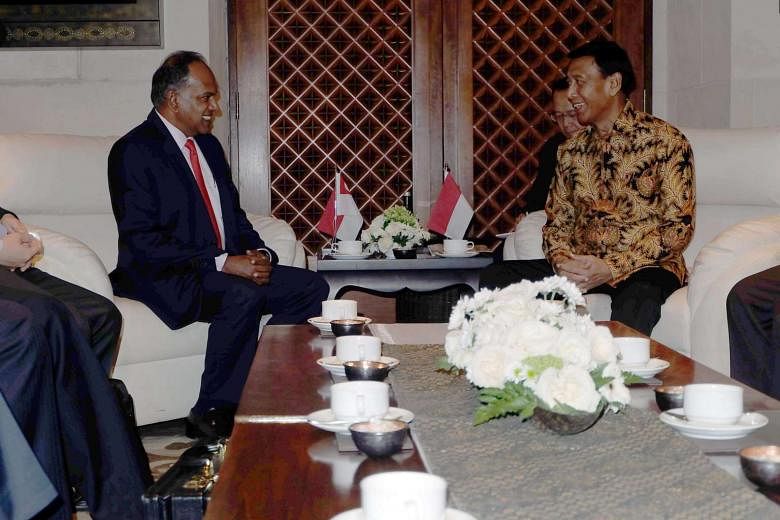Singapore, Malaysia and Indonesia yesterday agreed that the systematic exchange of biometric information like fingerprints on known militants and terror convicts is a key priority in the fight against terrorism.
Singapore Home Affairs and Law Minister K. Shanmugam, at separate meetings with his counterparts from both countries, also agreed that regular sharing of best practices in deradicalisation and countering violent extremism was a top priority, his ministry said in a statement.
The meetings come after Indonesia arrested six people in Batam last Friday over a terror plot to launch an attack on Singapore's Marina Bay using a rocket.
In his meeting with Malaysian Deputy Prime Minister and Home Affairs Minister Ahmad Zahid Hamidi, Mr Shanmugam discussed ways to further enhance cooperation between regional security and intelligence agencies.
Mr Shanmugam discussed similar concerns with Indonesia's Coordinating Minister for Political, Legal and Security Affairs Wiranto, whose officials also updated him on the recent arrests in Batam.
"We have been cooperating with each other," Mr Shanmugam told reporters. "But as tactics evolve, we need to also meet and discuss."
They were at a one-day International Meeting on Counter-Terrorism in Bali, where officials from 23 countries discussed ways to counter foreign terrorist fighters and their movement across borders.
Security agencies are concerned about the threat posed by more than 1,000 fighters from South-east Asia who have joined terror group Islamic State in Iraq and Syria (ISIS), as well as by several hundred terror convicts in Indonesia whose jail terms end in the next few years.
Indonesia's National Counter- Terrorism Agency chief Suhardi Alius told the conference that the Bali terror attacks in 2002 that killed 202 people, and those in 2005 that killed 20, were "the result of" Jemaah Islamiah (JI) members training in Afghanistan in the 1990s. He said: "The government does not want this to recur with the return of Indonesians from Iraq and Syria."
Last month, Malaysia said its immigration department was working closely with Indonesia to prevent returning fighters and terror convicts from entering its borders.
Singapore, Malaysia and Indonesia have adopted biometric passports for their citizens, and have biometric capture capabilities as part of their border control systems.
Yesterday, Singapore's Home Affairs Ministry said exchanging biometric data is crucial to deter and detect terrorists crossing borders.
"Given the transnational nature of terrorist networks and the attraction of ISIS propaganda, it is critical to deny terrorists ease of movement across borders and new recruits from among prisoners being released," it added.
Professor Rohan Gunaratna of Singapore's International Centre for Political Violence and Terrorism Research said systematic exchange of biometric data is key. He cited how several JI members fled Singapore and travelled in the region after a 2001 crackdown on the group, before being nabbed.
"Counter-terrorism cooperation between Singapore, Malaysia and Indonesia is critical for the stability and security of all three countries," he added.
The Bali meeting also discussed ways to counter extremist messages online, which have enabled groups like ISIS to attract new recruits, as well as ways to stem the flow of terror funds and weapons across borders.
SEE TOP OF THE NEWS
Top officials seek tougher steps to fight terrorism

